
In the depths of a freezing winter in 2005, European politicians anguished, as they do during many winters, about supplying heat to millions of homes and businesses. It was a good time for the Russian energy giant Gazprom to strike a deal with European utility companies to construct a hugely ambitious 1,200-km pipeline that would extend from the wilds of Siberia through the Baltic Sea to the German coastline and, starting in 2012, deliver about 55 billion cu m of natural gas annually to Western Europe. With investment in the pipeline venture totaling $7.4 billion, you might have expected the top executives, who include former German Chancellor Gerhard Schrder, to set up shop in a splashy metro like Berlin or Moscow. But the firm, now called Nord Stream, was quietly incorporated in a tiny Swiss town called Zug, where the one shopping street, Bahnhofstrasse, runs between a lake and Alpine hills and the best-known product is a cherry-liqueur torte.
Zug could easily pass for a provincial backwater — albeit one with $630,000 Ferraris parked in the local auto showroom. “This is a hick Swiss town,” says Christoph Eibl, managing director of Tiberius Asset Management, a hedge fund in Zug. “Nothing much happens here.”
Nothing much, that is, if you ignore Zug’s secretive business: the megadeals made by commodities traders in town. Inside Zug’s low-rise steel-and-glass buildings, some of the most crucial items on earth are bought and sold by the ton, barrel, kilo or bushel: iron ore, grain, copper, cobalt, tantalum, natural gas, oil, gold, diamonds, aluminum — the list goes on. London, Hong Kong and New York City might have the skyscrapers and glitz. But few meals are consumed without an ingredient traded by the merchants of Zug, and few of our cars or the gadgets on our desks would work without the minerals bought and sold from this spot in central Europe.
Zug canton — there are 26 cantons in Switzerland — is the small nation’s smallest state, with just 115,000 people. Yet its commercial registry lists more than 29,000 companies — nearly one for every person in town — and more than 1,000 more companies arrive each year. The registry includes Glencore, the world’s largest commodities trader, successor to the empire built by Marc Rich, who fled the U.S. in 1983 after being indicted for the biggest tax-evasion scheme in American history as well as for conducting business with Iran during the 1979 hostage crisis.
Rich the outlaw removed himself to Zug to take advantage of the anonymity and light taxes it offered, and he made it the center of no-questions-asked trading. For anyone wanting to do deals, be they with oil-rich-if-bloodstained despots or run-of-the-mill democracies, this was the place. For making Zug famous, Rich is still far more of a folk hero than a villain to locals. He was pardoned, controversially, by President Bill Clinton during Clinton’s final hours in the White House in January 2001. Rich still runs his affairs from a modest building near Zug’s rail station. “Marc Rich put Zug on the map,” says Stefan Gisler, a Green Party member of Zug’s parliament. “He saw all the advantages of our tax system for massive profits. He was the trendsetter.”
Among the thousands of companies that have arrived since Rich are Biogen, a Massachusetts-based biotech giant, and Transocean, the world’s biggest offshore-oil-drilling contractor, which moved to Zug from Houston in 2008, two years before its Deepwater Horizon rig exploded in the Gulf of Mexico last April, causing the most catastrophic oil spill the U.S. has ever seen. In 2009 American oil-services company Weatherford International also moved to Zug, yet, like Transocean, it continues to run its business from Houston. “A lot of commodities trading is done through Geneva, but those are financial transactions,” says Bernhard Neidhart, head of the Office of Economy and Labor for Zug canton. “But the traders? They are here.”
When those trading companies arrive, they find a warm welcome in Neidhart’s small office near the station, which is stocked with brochures the canton publishes featuring local golf courses and international schools. There is minimal paperwork, and it takes about a week to incorporate. Swiss officials, says Neidhart, assume that foreign companies pay taxes where they produce, while choosing Zug as a headquarters because of its genteel lifestyle, its central European location and the 20-minute train trip to Zurich’s sophisticated — and discreet — banks.
It’s a trip many find unnecessary, since their “headquarters” exist entirely within the stolid post office building, whose hall holds thousands of P.O. boxes retained by foreign companies. “Many company names are not even on any door. They just have a post office box in Zug,” says Rolf Schatzmann of PricewaterhouseCoopers in Zurich. “There are other places in the world like that, and Zug is just one of those places,” he says. “You can do that in Dubai. But it is easier here.”
The Top 10 Biz Deals of 2010.
See 10 Start-Ups That Will Change Your Life.